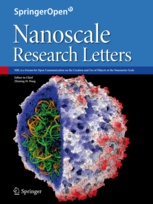 | |
| Discipline | Nanotechnology |
|---|---|
| Language | English |
| Edited by | Jiang Wu, Yu-Lun Chueh |
| Publication details | |
| History | 2006–present |
| Publisher | |
| Frequency | Monthly |
| Yes | |
| 4.703 (2020) | |
| Standard abbreviations | |
| ISO 4 | Nanoscale Res. Lett. |
| Indexing | |
| ISSN | 1556-276X |
| Links | |
Nanoscale Research Letters is a peer-reviewed open access scientific journal covering research in all areas of nanotechnology and published by Springer Science+Business Media.